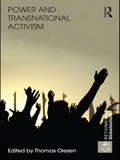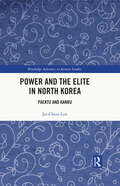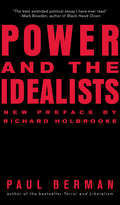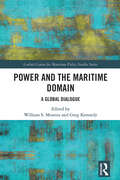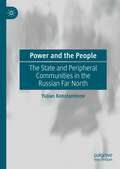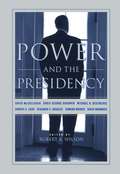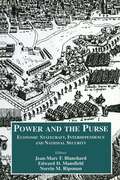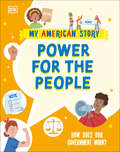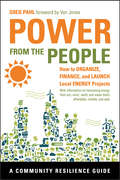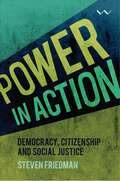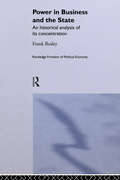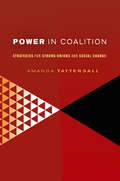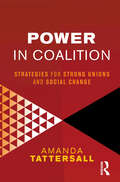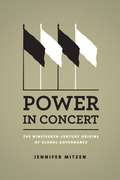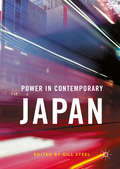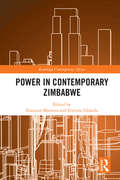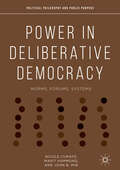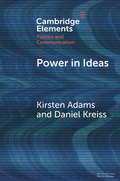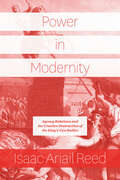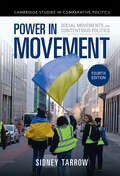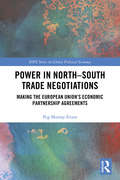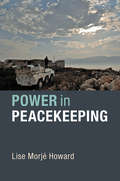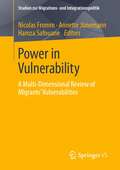- Table View
- List View
Power and Transnational Activism (Rethinking Globalizations)
by Thomas OlesenThis book focuses on global activism and uses a power perspective to provide an in-depth and coherent analysis of both the possibilities and limitations of global activism. Bringing together scholars from IR, sociology, and political science, this book offers new and critical insights on global activism and power. It features case studies on the following social and political issues: China and Tibet, HIV/AIDS, climate change, child labour, the WTO, women and the UN, the global public sphere, regional integration, national power, world social forums, policing, media power and global civil society. It will be of interest to students and scholars of globalization, global sociology and international politics.
Power and the Elite in North Korea: Paektu and Kanbu (ISSN)
by Jae-Cheon LimThis book explores how political power has shaped the elite and their development in North Korea by examining changes of the elite, their interactions, and specific elite figures, based on the transformation of the power structure and characteristics of the North Korean regime since August 1945.As a socialist state where the party guides the state, the ruling core is the party cadre in North Korea. This book distinguishes the development of the North Korean power into five periods: power structuration of the Soviet forces (1945 to the late 1940s), socialist oligarchic power (late 1940s to mid-1950s), limited personal power (mid-1950s to late 1960s), personal power (late 1960s to mid-1970s) and patrimonial power (mid-1970s to the present). In parallel with the power factor, it also analyses four distinct generations, sorted based on their birth cohort and each cohort’s shared experience in its early youth, to explain their political development.As an examination of the composition and internal dynamics of the North Korean elite, particularly those in the Korean Workers’ Party Central Committee, this book will be of interest to students and scholars of North Korea and Asian politics.
Power and the Idealists: Or, the Passion of Joschka Fischer and Its Aftermath
by Paul Berman Richard HolbrookeThe author of the best-selling Terror and Liberalism on the rise to power of the generation of 1968. The student uprisings of 1968 erupted not only in America but also across Europe, expressing a distinct generational attitude about politics, the corrupt nature of democratic capitalism, and the evil of military interventions. Yet, thirty-five years later, many in that radical generation had come into conventional positions of power: among them Bill Clinton (who reportedly stayed up all night reading this book) and Joschka Fischer, foreign minister of Germany. During a 1970s street protest, Fischer was photographed beating a cop to the ground; during the 1990s, he was supporting Clinton in a NATO-led military intervention in the Balkans. Here Paul Berman, "one of America's best exponents of recent intellectual history" (The Economist), masterfully traces the intellectual and moral evolution of an impassioned generation--and gives an acute analysis of what it means to go to war in the name of democracy and human rights.
Power and the Maritime Domain: A Global Dialogue (Corbett Centre for Maritime Policy Studies Series)
by Greg Kennedy William S. MoreiraThis book offers a multi-disciplinary and multi-national approach to defining key elements required to define power within the maritime domain. The volume engages with the concept that the maritime domain is a multi-dimensional space embracing oceans, seas, waterways, including all elements of maritime power, related activities, infrastructure, resources and assets. It illustrates the complexity and interconnectivity of the factors that contribute to the appreciation, creation, and application of maritime power. In practical terms, the book highlights that the maritime domain is a continuum that interconnects countries, cultures, politics, economics, trade, environment, knowledge, and technological power globally. Perhaps most importantly, the maritime domain generates power of its own volition, as well as acting as a critical enabler for the creation of other types of nations power: economic, political, military, technological, intelligence and fiscal power, in particular. The book not only brings those various factors to the reader’s attention but, in the synthesis, also clarifies the connections between the various elements in creating a greater maritime whole. This book will be of great interest to students of maritime security, strategic studies and International Relations.
Power and the People: The State and Peripheral Communities in the Russian Far North
by Yulian KonstantinovThis book discusses state-periphery relations from the view-point of a reindeer husbandry community in the Russian Far North (Murmansk Region). The time is the current period of Putin-led Russia. The analysis is based on the premise that the mode of current top-power governance can be described as selective de-centralization. Below a certain level of state power interests, conflicts get resolved in favour of local communities. That gains support for the supreme leadership, and reproduces a Soviet-like reality. Termed sovkhoism, the latter holds the Soviet state-farm (sovkhoz) as creating an ideal socio-economic environment. When issues are of significant interest to superior power, selection favours cavalier bypassing of people-friendly concerns. At this level, power acts in an authoritarian mode, favouring the interests of state power structures in conjunction with the upper tiers of the loyal oligarchate. It is shown how this governing mode contains significant potential for escalating centre vs. periphery tensions.
Power and the Presidency
by Robert A. WilsonThis sterling collection of original, never-before-published essays on six fascinating contemporary presidents by some of the leading presidential biographers of our time is must reading for anyone interested in American politics, the history of the American presidency, or the lives of the presidents. Each essay-extending and elaborating on lectures originally delivered as part of the Montgomery Lecture Series at Dartmouth University-explores how a particular president came to power, wielded power, and was changed by power, and how each presidency affected the power of the office itself. The presidencies addressed are those of Roosevelt, Eisenhower, Kennedy, Johnson, Reagan, and Clinton. Published as our nation begins the process of electing the 43rd president, during a time when some believe the independence of the office itself is at stake, Power and the Presidency is a timely and thought-provoking look at the nature of power in American democracy.
Power and the Purse: Economic Statecraft, Interdependence and National Security
by Edward D. Mansfield Norrin M. Ripsman Jean-Marc F. BlanchardThe essays here address the relationship between economic interdependence and international conflict, the political economy of economic sanctions, and the role of economic incentives in international statecraft.
Power and the Vote
by Brian MinHow do developing states decide who gets access to public goods like electricity, water, and education? Power and the Vote breaks new ground by showing that the provision of seemingly universal public goods is intricately shaped by electoral priorities. In doing so, this book introduces new methods using high-resolution satellite imagery to study the distribution of electricity across and within the developing world. Combining cross-national evidence with detailed sub-national analysis and village-level data from India, Power and the Vote affirms the power of electoral incentives in shaping the distribution of public goods and challenges the view that democracy is a luxury of the rich with little relevance to the world's poor.
Power for the People: How does our Government Work? (My American Story)
by DKInspires young learners to explore America&’s government institutions through the nation&’s history and the experience of modern AmericansPart of an inspiring series of books that will support students to understand government and civics in modern America through the historical events and people that have shaped them, Power for the People will interweave historical context, events and personalities with the experiences of modern Americans to help students understand key social studies topics including the origins of American institutions and values and their relevance to young people&’s lives today.The book explores the institutions and systems of American government as a constitutional republic, and the reasons for them, including roles of President, Congress, Supreme Court, state government and other national and international bodies. Historical topics / events covered include: US Constitution and amendments, elections, and key historical Presidents.
Power from the People: How to Organize, Finance, and Launch Local Energy Projects
by Greg Pahl"Over 90 percent of US power generation comes from large, centralized, highly polluting, nonrenewable sources of energy. It is delivered through long, brittle transmission lines, and then is squandered through inefficiency and waste. But it doesn't have to be that way. Communities can indeed produce their own local, renewable energy. Power from the People explores how homeowners, co-ops, nonprofit institutions, governments, and businesses are putting power in the hands of local communities through distributed energy programs and energy-efficiency measures. Using examples from around the nation - and occasionally from around the world - Greg Pahl explains how to plan, organize, finance, and launch community-scale energy projects that harvest energy from sun, wind, water, and earth. He also explains why community power is a necessary step on the path to energy security and community resilience - particularly as we face peak oil, cope with climate change, and address the need to transition to a more sustainable future. This book - the second in the Chelsea Green Publishing Company and Post Carbon Institute's Community Resilience Series - also profiles numerous communitywide initiatives that can be replicated elsewhere. "--
Power in Action: Democracy, citizenship and social justice
by Steven FriedmanArgues that South Africans, like everyone else, need democracy for a more equal societyWhat are democracies meant to do? And how does one know when one is a democratic state? These incisive questions and more by leading political scientist, Steven Friedman, underlie this robust enquiry into what democracy means for South Africa post 1994. Democracy is often viewed through a lens reflecting Western understanding. New democracies are compared to idealized notions by which the system is said to operate in the global North. The democracies of Western Europe and North America are understood to be the finished product and all others are assessed by how far they have progressed towards approximating this model.Power in Action persuasively argues against this stereotype. Friedman asserts that democracies can only work when every adult has an equal say in the public decisions that affect them.Democracy is achieved not by adopting idealized models derived from other societies–rather, it is the product of collective action by citizens who claim the right to be heard not only through public protest action, but also through the conscious exercise of influence on public and private power holders.Viewing democracy in this way challenges us to develop a deeper understanding of democracy’s challenges and in so doing to ensure that more citizens can claim a say over more decisions in society.
Power in Business and the State: An Historical Analysis of its Concentration (Routledge Frontiers of Political Economy #Vol. 36)
by Frank BealeyIt is commonplace that political power is becoming more centralized and remote: faceless people, sometimes in unknown places, determine our circumstances and our opportunities. This ground breaking book argues that this happened through a slow development which began before globalization.Power in Business and the State queries our freedom to make our own history. Current circumstances may be so far from our own choosing that our history is now being made for us, rather than something we control ourselves. Political power is so centralized, and economic power so concentrated, that popular control of democratic government has become increasingly difficult.The sheer magnitude of the author's research underpinning this book, and the uncluttered methodological framework in which it is presented, provides a highly readable text.
Power in Coalition: Strategies for Strong Unions and Social Change
by Amanda TattersallThe labor movement sees coalitions as a key tool for union revitalization and social change, but there is little analysis of what makes them successful or the factors that make them fail. Amanda Tattersall-an organizer and labor scholar-addresses this gap in the first internationally comparative study of coalitions between unions and community organizations. Tattersall argues that coalition success must be measured by two criteria: whether campaigns produce social change and whether they sustain organizational strength over time. The book contributes new, practical frameworks and insights that will help guide union and community organizers across the globe. The book throws down the gauntlet to industrial relations scholars and labor organizers, making a compelling case for unions to build coalitions that wield "power with" community organizations. Tattersall presents three detailed case studies: the public education coalition in Sydney, the Ontario Health Coalition in Toronto, and the living wage campaign run by the Grassroots Collaborative in Chicago. Together they enable Tattersall to explore when and how coalition unionism is the best and most appropriate strategy for social change, organizational development, and union renewal. Power in Coalition presents clear lessons. She suggests that "less is more," because it is often easier to build stronger coalitions with fewer organizations making decisions and sharing resources. The role of the individual, she finds, is traditionally underestimated, even though a coalition's success depends on a leader's ability to broker relationships between organizations while developing the campaign's strategy. The crafting of goals that combine organizational interest and the public interest and take into account electoral politics are crucial elements of coalition success. For more about Power in Coalition, visit the author's wesbite: http://powerincoalition. com.
Power in Coalition: Strategies for strong unions and social change
by Amanda TattersallHow can we change things in an age in which governments are fixated on the bottom line and conventional protest rallies have lost their punch?Coalitions can be important tools for social change and union revitalisation. What makes them successful? What causes them to fail? Community organiser Amanda Tattersall examines successful coalitions between unions and community organisations in three countries: the public education coalition in Sydney, Toronto's Ontario Health Coalition fighting to save universal health care, and Chicago's living wage campaign run by the Grassroots Collaborative. She explores when and how coalitions can be a powerful strategy for social change, organisational development and union renewal.Power in Coalition is essential reading for unionists, community activists, and anyone passionate about social change.'A fascinating insight into the potential for coalitions to restore the balance of power between governments and the communities they are supposed to serve.' - Julian Burnside AO QC'Amanda Tattersall shows that coalitions, though hard work at times, are the best means we have to rebalance power, beat poverty and injustice, and build a future that includes all of us, especially the weakest.' - Tim Costello AO, CEO, World Vision Australia'If unions are to maximise their influence in the 21st century they must build alliances with other organisations around economic, social and ecological concerns affecting humanity. This book shows it is possible to build the necessary coalitions to achieve this end.' - Jack Mundey AO, instigator of the 1970s Green Bans movement in Sydney
Power in Concert: The Nineteenth-Century Origins of Global Governance
by Jennifer MitzenHow states cooperate in the absence of a sovereign power is a perennial question in international relations. With Power in Concert, Jennifer Mitzen argues that global governance is more than just the cooperation of states under anarchy: it is the formation and maintenance of collective intentions, or joint commitments among states to address problems together. The key mechanism through which these intentions are sustained is face-to-face diplomacy, which keeps states’ obligations to one another salient and helps them solve problems on a day-to-day basis.Mitzen argues that the origins of this practice lie in the Concert of Europe, an informal agreement among five European states in the wake of the Napoleonic wars to reduce the possibility of recurrence, which first institutionalized the practice of jointly managing the balance of power. Through the Concert’s many successes, she shows that the words and actions of state leaders in public forums contributed to collective self-restraint and a commitment to problem solving—and at a time when communication was considerably more difficult than it is today. Despite the Concert’s eventual breakdown, the practice it introduced—of face to face diplomacy as a mode of joint problem solving—survived and is the basis of global governance today.
Power in Contemporary Japan
by Gill SteelThis book discusses Japanese conceptions of power and presents a complex, nuanced look at how power operates in society and in politics. It rejects stereotypes that describe Japanese citizens as passive and apolitical, cemented into a vertically structured, group-oriented society and shows how citizens learn about power in the contexts of the family, the workplace, and politics. As Japan grapples with the consequences of having one of the oldest and most rapidly ageing populations in the world, it is important for social scientists and policy makers worldwide to understand the choices it makes. Particularly as policy-makers have once again turned their attention to workers, the roles of women, families, and to immigrants as potential 'solutions' to the perceived problem of maintaining or increasing the working population. These studies show the ebb and flow of power over time and also note that power is context-dependent -- actors can have power in one context, but not another.
Power in Contemporary Zimbabwe (Routledge Contemporary Africa)
by Erasmus Masitera Fortune SibandaIn recent years, the Zimbabwe crisis rendered the country and its citizens to be a typical case of ‘failed states’, the world over. Zimbabwean society was and is still confronted with different challenges which include political, economic and social problems. Attempts to overcome these challenges have thrown light on the power that rests within individuals and or groups to change and even revolutionize their localities, communities, states and ultimately the world at large. Through experience, individuals and groups have promoted ideas that have aided in changing mentalities, attitudes and behaviors in societies at different levels. This book brings together contributors from various academic disciplines to reflect on and theorize the contours of power, including the intrinsic and or extrinsic models of power, which pertain to individuals, communities, and or groups in order to transform society. Reflections are on various groups such as political movements, environmental movements, religious groups, advocacy groups, gender groups, to mention but a few, as they struggle against marginalization, discrimination, exploitation, and other forms of oppression showing their agency or compliance.
Power in Deliberative Democracy: Norms, Forums, Systems (Political Philosophy and Public Purpose)
by Nicole Curato Marit Hammond John B. MinDeliberative democracy is an embattled political project. It is accused of political naiveté for it only talks about power without taking power. Others, meanwhile, take issue with deliberative democracy’s dominance in the field of democratic theory and practice. An industry of consultants, facilitators, and experts of deliberative forums has grown over the past decades, suggesting that the field has benefited from a broken political system.This book is inspired by these accusations. It argues that deliberative democracy’s tense relationship with power is not a pathology but constitutive of deliberative practice. Deliberative democracy gains relevance when it navigates complex relations of power in modern societies, learns from its mistakes, remains epistemically humble but not politically meek. These arguments are situated in three facets of deliberative democracy—norms, forums, and systems—and concludes by applying these ideas to three of the most pressing issues in contemporary times—post-truth politics, populism, and illiberalism.
Power in Ideas: A Case-Based Argument for Taking Ideas Seriously in Political Communication (Elements in Politics and Communication)
by Kirsten Adams Daniel KreissThis Element argues that understanding media and democracy in troubled times requires an analytical framework that takes seriously the role of ideas in political life and communication. We develop a framework for analyzing ideas and argue that the empirical study of ideas should combine interpretive approaches to derive meaning and understand influence with quantitative analysis to help determine the reach, spread, and impact of ideas. We illustrate our approach through three case studies: the idea of reparations in Ta-Nehisi Coates's 'The Case for Reparations,' the idea of free expression in Mark Zuckerberg's Facebook policy speech at Georgetown, and Andrew Yang's idea of the “Freedom Dividend” as a form of universal basic income. We trace the landscapes and spheres within which these ideas emerged and were articulated within, the ways they were encoded in discourse, the fields they travelled across, and how they became powerful.
Power in Modernity: Agency Relations and the Creative Destruction of the King’s Two Bodies
by Isaac Ariail ReedIn Power in Modernity, Isaac Ariail Reed proposes a bold new theory of power that describes overlapping networks of delegation and domination. Chains of power and their representation, linking together groups and individuals across time and space, create a vast network of intersecting alliances, subordinations, redistributions, and violent exclusions. Reed traces the common action of “sending someone else to do something for you” as it expands outward into the hierarchies that control territories, persons, artifacts, minds, and money. He mobilizes this theory to investigate the onset of modernity in the Atlantic world, with a focus on rebellion, revolution, and state formation in colonial North America, the early American Republic, the English Civil War, and French Revolution. Modernity, Reed argues, dismantled the “King’s Two Bodies”—the monarch’s physical body and his ethereal, sacred second body that encompassed the body politic—as a schema of representation for forging power relations. Reed’s account then offers a new understanding of the democratic possibilities and violent exclusions forged in the name of “the people,” as revolutionaries sought new ways to secure delegation, build hierarchy, and attack alterity. Reconsidering the role of myth in modern politics, Reed proposes to see the creative destruction and eternal recurrence of the King’s Two Bodies as constitutive of the modern attitude, and thus as a new starting point for critical theory. Modernity poses in a new way an eternal human question: what does it mean to be the author of one’s own actions?
Power in Movement: Social Movements and Contentious Politics (Cambridge Studies in Comparative Politics)
by Sidney TarrowSocial movements have an elusive power but one that is altogether real. From the French and American revolutions to the Arab Spring, and to ethnic and terrorist movements of today, contentious politics exercises a fleeting but powerful influence on politics, society and international relations. Covering key episodes up to the attack on the US Capitol in January 2021, leading scholar of politics and government Sidney Tarrow uses a number of recent, historical and comparative case studies to introduce his theory of social movements and political parties. The fourth edition of this classic study emphasizes the symbiotic relations between social movements and parties by focusing attention on the growing role of populism in Europe, Latin America, and the US; analyzes the role of social media as a mobilizing and aggregating force for social movements; highlights the relations between structural changes in the economy and new forms of contention; draws on new material on movements in the Global South and the relations between movements and democracy.
Power in North-South Trade Negotiations: Making the European Union's Economic Partnership Agreements (RIPE Series in Global Political Economy)
by Peg Murray-EvansAdvancing a constructivist conceptual approach, this book explains the surprising outcome of the Economic Partnership Agreements (EPAs) between the European Union and developing countries in Africa, the Caribbean and the Pacific (the ACP countries). Despite the EU’s huge market power, it had limited success with the EPAs; an outcome that confounds materialist narratives equating trade power with market size. Why was the EU unable to fully realise its prospectus for trade and regulatory liberalisation through the EPA negotiations? Emphasising the role of social legitimacy in asymmetrical North–South trade negotiations, Murray-Evans sets the EPAs within the broader context of an institutionally complex global trade regime and stresses the agency of both weak and strong actors in contesting trade rules and practices across multilateral, regional and bilateral negotiating settings. Empirical chapters approach the EPA process from different institutional angles to explain and map the genesis, design, promotion and ultimately limited impact of the EU’s ambitious prospectus for the EPAs. This volume will be particularly relevant to students and scholars of international trade and development and the EU as an international actor, as well as those researching international political economy, African politics and international trade law.
Power in Peacekeeping
by Lise HowardUnited Nations peacekeeping has proven remarkably effective at reducing the death and destruction of civil wars. But how peacekeepers achieve their ends remains under-explored. This book presents a typological theory of how peacekeepers exercise power. If power is the ability of A to get B to behave differently, peacekeepers convince the peacekept to stop fighting in three basic ways: they persuade verbally, induce financially, and coerce through deterrence, surveillance and arrest. Based on more than two decades of study, interviews with peacekeepers, unpublished records on Namibia, and ethnographic observation of peacekeepers in Lebanon, DR Congo, and the Central African Republic, this book explains how peacekeepers achieve their goals, and differentiates peacekeeping from its less effective cousin, counterinsurgency. It recommends a new international division of labor, whereby actual military forces hone their effective use of compulsion, while UN peacekeepers build on their strengths of persuasion, inducement, and coercion short of offensive force.
Power in Uncertain Times: Strategy in the Fog of Peace
by Emily O. GoldmanThis book examines America's evolving strategy on the international security environment, and comprehensively analyzes how different strategies position states to compete in the present and future, manage risk, and prevail despite uncertainty.
Power in Vulnerability: A Multi-Dimensional Review of Migrants’ Vulnerabilities (Studien zur Migrations- und Integrationspolitik)
by Annette Jünemann Nicolas Fromm Hamza SafouaneWith this volume, the editors propose a multi-dimensional and critical review of migrants’ vulnerabilities. They argue that a deeper understanding of vulnerability is paramount to discuss empowerment and resilience. Regardless of their motivations, migrants can face vulnerabilities at any of the stages of their journey. These vulnerabilities may change over time for better or worse, corresponding with a person’s legal status, migratory path and the practices of migration regulation. This book addresses vulnerability from an interdisciplinary and intersectional perspective. It brings together latest academic research and practitioners’ insights to help reception societies adapt and improve their dealing with migrants’ vulnerabilities.
